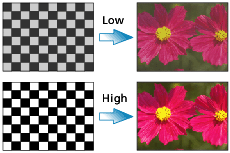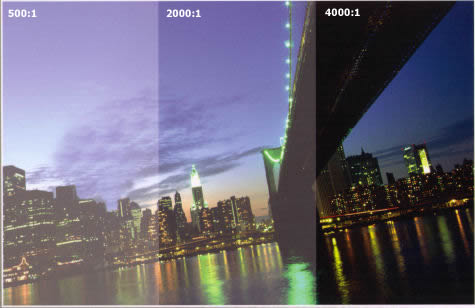Projector Contrast Ratio
Simply put projector contrast ratio is defined as the ratio of the number of layers between white and black of the image on your screen. Essentially a
higher contrast projector increases the perception of depth in the image, and means subtle colour variations show up more clearly. Hence textures
and detail are more visible. It also means that dark scenes can cope with more ambient light in the room.
"So in a nut shell, you want the highest contrast ratio available"
There are two methods of measurement:
Full On/Off - this is a measure between an all white image (full on) and an all black (full off) image.
ANSI - is measured with a pattern of 16 alternating black and white rectangles. The average light output from the
white rectangles is divided by the average light output of the black rectangles to determine the ANSI contrast-ratio.
Full on/off figures are much higher than ANSI.
For a Recommendation:
Call 1300 88 11 79
For a Recommendation:
Call 1300 88 11 79
Never compare ANSI with Full on/off figures.
To highlight the problem take a look at these two projectors, the HP SB21 has an ANSI ratio of 450:1 and a Full on/Full off ratio of 1800:1.
If you now look at the NEC SX6000 it has an ANSI of 250:1 and a FO/FO of 400:1. So there is no correlation between the two!
Unfortunatly because Full On/Off makes all projectors look like they have advanced, all manufacturers have adopted it. When possible we list
ANSI figures.
A visual comparison between ratios.

low and high comparison

Image, with different projector contrast ratios
Daylight View
Daylight View is a Panasonic technology. It is designed to boost the image to compensate for high ambient light.
When switched on it seems to work by boosting the image brightness. But adjusting the brightness alone does not have this effect.
Under the hood Daylight view is tweeking the gamma, brightness and contrast-ratio.

Daylight View - Off

Daylight View - On




















































